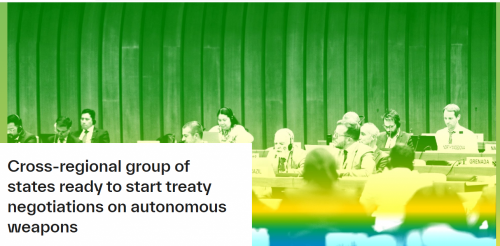
https://www.stopkillerrobots.org/news/september-2025-gge-joint-statement/
Brazil delivered a joint statement on behalf of 42 states*, stating that they are “ready to move ahead towards negotiations” on an instrument on autonomous weapons systems on the basis of the Chair’s rolling text. This is one third of the 128 states party to the Convention on Certain Conventional Weapons (CCW), the framework in which the GGE takes place.
This rolling text contains elements that could be used as a starting point for the development and agreement of rules in a treaty. It has been developed and refined since 2024 by states at the GGE under the GGE Chairmanship of H.E. Ambassador Robert in den Bosch of the Kingdom of the Netherlands. The GGE currently has a mandate to work on a set of elements of an instrument, without prejudging its nature, and other possible measures, to address the issue of autonomous weapons systems. The joint statement records the view of the group that the rolling text “is a sufficient basis to fulfil the mandate of this GGE in its current form” and a “sufficient basis for negotiations on an instrument on lethal autonomous weapons systems”.
It is significant that this broad group of regionally and politically diverse states have recognised that they have the content to launch negotiations and share a willingness to move toward doing so.The GGE’s mandate will continue to stand until the CCW’s Seventh Review Conference in 2026, where the states have the chance to take the next step by agreeing to a negotiation mandate for a legally binding instrument on autonomous weapons systems. In the past, progressive outcomes at the GGE have been stymied due to a small group of states abusing the forum’s consensus rules, where strong language supporting legally binding prohibitions and regulations is weakened to achieve consensus. Despite this, discussions at the two GGE meetings this year have demonstrated that states actually share much common ground: on the need for a two-tier approach of prohibitions and regulations; on the need for meaningful human control; and on many of the basic elements of such control.
Stop Killer Robots urges states to seize the opportunity of the common ground they share to move to negotiations – negotiations that must include all states that are willing to turn discussions into law, with the full participation of civil society and other observers.
For over a decade, Stop Killer Robots has called upon states to urgently launch negotiations on a legally binding instrument on autonomous weapons systems to reject the automation of killing and ensure meaningful human control over the use of force. GGE discussions on possible legal safeguards do not exist in a vacuum. Indeed, the need for new international law has become more pressing as reports continue to emerge on the development of weapons systems with concerning levels of autonomy in Ukraine and Gaza, along with the use of AI powered decision support systems in the latter. Humanitarian harm resulting from the use of these technologies is a reality and must be urgently addressed.
During the GGE meetings at the UN in Geneva, Stop Killer Robots and its campaign members raised that crucial elements of a legal instrument are still missing from the ‘rolling text’. These include prohibitions on systems that are fundamentally unacceptable, notably those that target people among other ethical and human rights considerations. Although these crucial elements are not currently reflected in the rolling text, states should commit to tackling thems during negotiations.
We urge states to build on the political will and courage they have demonstrated in these meetings and launch negotiations that would create new international law to close the gap between innovation and regulation as soon as possible. Now is the time to ensure a world where human life is valued and protected against digital dehumanisation and the automation of killing.
*39 High Contracting Parties, and 3 observer states supported the joint statement including: Austria, Belgium, Brazil, Bulgaria, Chile, Colombia, Costa Rica, Denmark, Dominican Republic, Ecuador, El Salvador, Finland, France, Germany, Guatemala, Iceland, Ireland, Italy, Kazakhstan, Kiribati (observer), Lesotho, Luxembourg, Malawi, Mexico, Montenegro, Nauru, New Zealand, North Macedonia, Norway, Pakistan, Palestine, Panama, Peru, Portugal, Samoa (observer), Sierra Leone, Slovenia, Spain, Sweden, Switzerland, Thailand (observer), and Uruguay.
Stop Killer Robots









